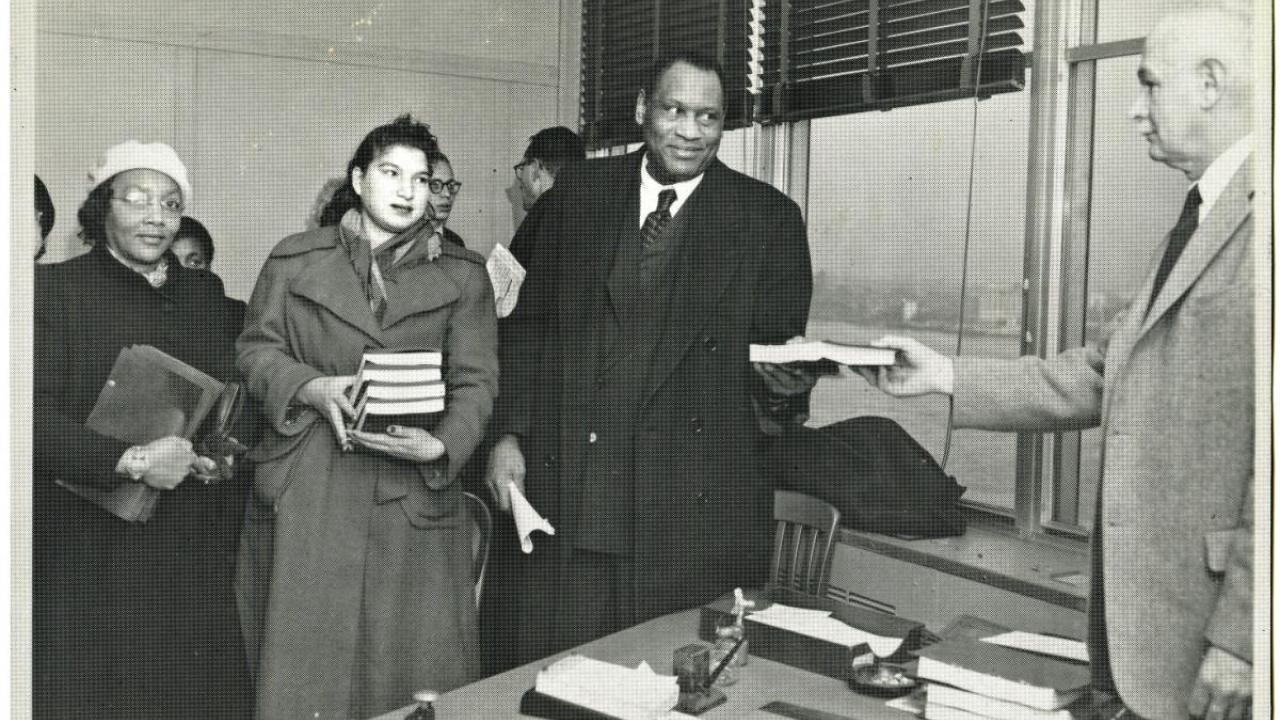
Session 1
Teaching African American Histories of Human Rights and Reparations Activism
Quick Summary
- How to restore human rights to African American History?
Session Description:
This year, a coalition of young people, activists, and educators from across California have continued to organize in defense of the new Ethnic Studies requirements for public secondary education in California, including how African American History will be taught. Black Studies has always necessarily been diasporic, international, and global, centering African-descended people, ideas, and practices from Africa, the Caribbean, North America, and around the world. Yet when developing state standards and curricula, African American History often becomes embroiled in attacks on ethnic studies and global thinking. This creates pressure to avoid teaching broad-based movements for freedom, human rights, and reparations and instead teach only campaigns for domestic civil rights and inclusion in electoral politics. This pressure to take our “eyes off the prize,” as happened with the shift away from Black human rights advocacy during the Cold War, threatens to overpower truth and justice in our present moment. In this session we will ask how the long and broad history of African American human rights and reparations activism might be taught, and collaboratively design a unit that aligns with the new California State Ethnic Studies curriculum standards, the new AP African American History course framework, and "Area H" of the UC admissions A-G requirements.
ACTIVITY
Session participants will work in groups of 2-3 to design the outline for a sample syllabus that features human rights and reparations and aligns with the requirements of the CA Ethnic Studies curriculum framework, Area H of the A-G’s, and/or the new AP African American History course. The syllabus outline should include a few key standards, essential questions, learning objectives, and weekly themes and topics.
Documents:
CA Dept. of Education Ethnic Studies curriculum framework; AP African American History course framework; Civil Rights Congress, "We Charge Genocide" (1951); We Charge Genocide Chicago Report (2014); We Charge Genocide Chicago Report (2014); Keywords for African American Studies.
CONVENOR: Benjamin D. Weber is an interdisciplinary scholar of African American History, Critical Carceral Studies, and Black Social and Political Thought, and an assistant Professor of African American & African Studies here at UC Davis. His research and teaching focuses on structural racism, inequality, and social movements. His recent article on “Rethinking Human Rights through the Imprisoned Black Radical Tradition” was published in the Journal of African American History, and he is currently finishing his first book, American Purgatory: Race, Empire, and the Carceral State, which is forthcoming from The New Press.
CONVERSOR: Dominique Williams is the Ethnic Studies Coordinator at the UC Davis History Project. She taught at C.K. McClatchy and Luther Burbank High Schools in Sacramento City Unified School District and has piloted Ethnic Studies in SCUSD shortly after supporting the student-led effort to implement Ethnic Studies as a graduation requirement. With Ethnic Studies Now-Sacramento, she advocated for the passage of Assembly Bill 2016, which authorized the California Ethnic Studies Model Curriculum. With History Project, she has served as a teacher leader for both the UC Berkeley History-Social Science Project and at UC Davis. She has been an active educator in the Black Parallel School Board in Sacramento, Teachers for Social Justice, the Liberated Ethnic Studies Model Curriculum and the Education for Liberation Network. With a BA in African American Studies and History, her secondary teaching credential, she is currently pursuing her Administrative Services Credential. During the shelter-in-place directive, our state office, the California History-Social Science Project featured her in a teacher spotlight. Read her teacher spotlight, here. Her writing is featured in Rethinking Ethnic Studies.
Génesis Lara - Chicano-Latino Studies, UC Irvine
Anthony Green – African American History Teacher, Bishop O’Dowd, Oakland
Can you add someplace that we will be joined by two AP African American History students from Mr. Green's class at Bishop O'Dowd High School in Oakland, who will share a brief presentation about their class' work on reparations?
Documents/Sources:
